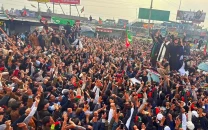Climate change impact: Parents, teachers rethink winter holidays for schools
Scientists urge schools to adapt holidays to new weather patterns.

Climate change impact: Parents, teachers rethink winter holidays for schools
With the morning temperatures hovering just above freezing, their mother kept them at home rather than have them sit in unheated classrooms during a bone-chilling cold snap that gripped the capital for much of a month.
“How could I be so heartless to allow my children to go to school in the harsh cold?” she asked. Her 10-year-old daughter Amina said that heavy fog on the first of January also forced her and her sister to turn back and return to their home in Ghouri, a neighbourhood on the outskirts of Islamabad, during their walk to school.
“It looked like dense wet clouds had landed on the ground, with almost zero visibility in the morning,” she told the Thomson Reuters Foundation recently as she and her sister returned home from school with their classmates.
Schools in Pakistan normally reopen on January 1, but this year many parents, particularly in Islamabad and its surrounding areas, have been reluctant to send their children as temperatures remain unusually low.
Some parents and teachers have urged the government to extend the normal two-week winter holidays to protect the health of both children and teachers - a measure some schools undertook.
“Teaching in classrooms without heaters in such freezing cold weather compelled me and the most of my fellow teachers to refuse to attend school,” said Naila Khan, a biology teacher at a government girls’ school in Islamabad’s upscale F-6 sector.
“Many schools like ours are without heaters to keep the classrooms warm, and even if there are heaters, they’re good for nothing because of extended gas and electricity outages,” she said.
Part of the problem, she said, was that the two-week school winter break is aimed to fall on the coldest days of the year - but this year the colder period came much later, as weather grows more unpredictable across the country as a result of climate change.
Hotter, longer summers
Schools are experiencing similar problems at the other end of the year as well when the weather turns too hot for students and teachers to focus on their work now that summer often extends beyond the usual June and July summer break.
Last year, schools were supposed to reopen on August 1 after the usual two-month summer break, but the government extended the holiday until mid-August, following temperature highs of between 35 and 41 degrees Celsius in all but the mountainous northern areas.
Scientists at the Pakistan Meteorological Department (PMD) say that each successive summer since 2010 has been the hottest recorded in the country, with increasingly frequent and intense heatwaves.
At the same time, cold winter days have begun later each year for about the last six years.
Ghulam Rasul, head of the PMD and the permanent representative of Pakistan with the United Nations’ World Meteorological Organization, said significant natural variation was to be expected from year to year in the onset of winter and summer and in terms of temperature extremes. But he added that a shift in the seasons of at least 15 days had been observed over the past 20 years, meaning that summer was beginning earlier and winter later than average.
He urged school officials to adapt school schedules to the new reality.
“Considering the highly erratic weather patterns, it would be a saner approach to adapt annual academic vacation schedules to the shifting seasonal patterns,” he said.
He suggested extending holiday leave periods by about two weeks to allow a “cushion” for more intense temperature extremes.
Thomson Reuters Foundation
Published in The Express Tribune, February 14th, 2017.


















COMMENTS
Comments are moderated and generally will be posted if they are on-topic and not abusive.
For more information, please see our Comments FAQ